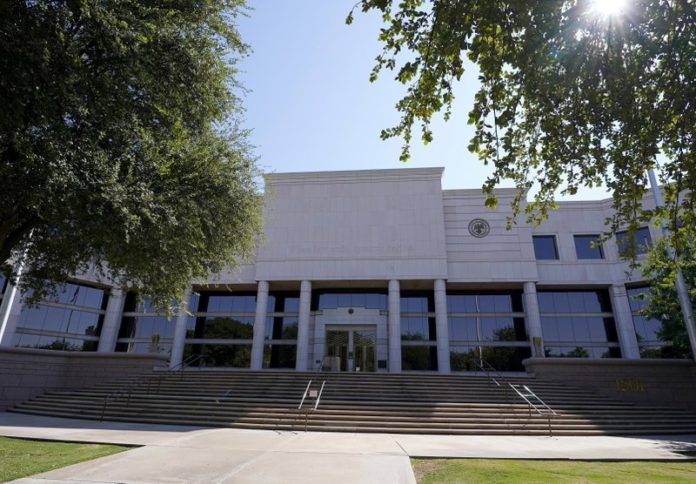
Republican Arizona Gov. Doug Ducey and the GOP leaders of the state House and Senate are urging the state Supreme Court to overrule lower court judges and block three voter initiatives from the ballot.
They argue that many paid petition circulators did not file new affidavits certifying they met legal requirements each time they told the secretary of state they would gather needed signatures for a particular initiative.
But backers of the three initiatives hoping to make November’s ballots say they followed the laws and rules in the state election procedures manual that Ducey himself signed off on and called his actions surprising.
“He is one of the people, along with the secretary of state and the attorney general, who by law are required to approve the elections manual, and it’s the elections manual that our circulators were following,” said Terry Goddard, a former Arizona attorney general who is among a bipartisan group including business figures backing an initiative requiring full disclosure of political spending.
“And it’s the procedure in the elections manual that the governor’s brief now says should not have been followed,” Goddard said Tuesday. “So he’s basically arguing against the position that he himself took. That’s the thing that just I find astonishing.”
A spokesman for Ducey, C.J. Karamargin, said his lawyers believe the election manual does not say that and neither does the law.
“The filings speak for themselves,” Karamargin said Tuesday. “We believe the court should follow the clear intent of the statute.”
The lower courts had ruled that the law only requires paid circulators to file an affidavit when they initially register as paid circulators. The secretary of state’s online registration portal mirrors that and does not even allow them to file one for each initiative they intend to collect signatures for.
All three initiatives were challenged by business groups. They challenged signatures gathered by circulators for a variety of reasons, arguing that some failed to provide or omitted required information on the petitions or in filings with the secretary of state’s office. One challenge also questioned whether a summary voters see when they sign petitions properly described a key part of the measure.
Two of the initiatives – one limiting so-called predatory debt collection and Goddard’s political spending transparency measure – easily survived court challenges to their signatures. The secretary of state certified that the predatory debt measure had far above the nearly 238,000 valid signatures required to make the November ballot, and the political spending measure awaits that final certification.
The debt measure also survived the challenge to the 100-word summary voters see, with a judge ruling last week that the Predatory Debt Collection Protection Act was properly described to voters.
The third measure hangs by a shoestring, and its fate appears tied to how a final signature count is tallied after signatures gathered by circulators who made mistakes are tossed out and the secretary of state’s final review.
The Free and Fair Elections measure, which would expand voting access and roll back tightened election laws passed by Legislature and signed by Ducey, is either 10,000 signatures above what is needed or 10,000 below, lawyers involved say.
Initiative signatures and documents are weighed by judges under a “strict compliance” legal standard the GOP-controlled Legislature and Ducey put in place in 2017. GOP lawmakers said it was needed because once an initiative is enacted, it is nearly impossible for the Legislature to change it. The change made it easier to throw them out for relatively minor paperwork errors.
Appeals to rulings on the current initiative challenges issued by Maricopa County judges last week are now before the state Supreme Court. County ballot printing deadlines begin at the end of the week, so the court needs to rule quickly.
The judges in all three challenges said the law does not specifically say a new affidavit is needed for each initiative.
“If the Legislature intended that all non-Arizona residents and all paid circulators must register more than one time and submit registration applications and affidavits each time, it could have said so expressly in the statute, but it did not do so,” Maricopa County Superior Court Judge Frank Moskowitz wrote in his ruling allowing the debt measure to proceed to the ballot.
But the lawyer for Ducey, joined by Senate President Karen Fann and House Speaker Rusty Bowers, told the high court that the law really means that a circulator needs a separate affidavit for each initiative even if the law does not specifically require it.
“Allowing paid circulators to use their prior affidavits undermines the policy goals embodied in the statute,” attorney Dominic Draye wrote.
Jim Barton, an attorney who represents all two of the three initiative committees, says Ducey’s position is surprising because he is asking the court to ignore the plain language of the law.
“He’s supposed to be a conservative governor, and he’s now saying that he can change the law because he meant to say something different,” Barton said.
All three initiatives could fall sort of the needed signatures if Ducey’s argument over the affidavits is accepted by the Supreme Court.
Republished with the permission of The Associated Press.













